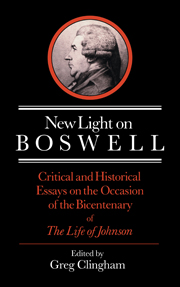 New Light on Boswell
New Light on Boswell Book contents
- Frontmatter
- Contents
- Notes on contributors
- Preface
- Acknowledgements
- Abbreviations
- 1 Introduction: Boswell's ambiguities
- Part I BOSWELL AND EIGHTEENTH-CENTURY SCOTTISH CULTURE
- Part II CONTEXTS FOR THE LIFE OF JOHNSON
- 6 Boswell's liberty-loving Account of Corsica and the art of travel literature
- 7 Boswell and sympathy: the trial and execution of John Reid
- 8 Boswell and Hume: the deathbed interview
- 9 “This Philosophical Melancholy”: style and self in Boswell and Hume
- Part III THE LIFE OF JOHNSON RECONSIDERED
- Index
8 - Boswell and Hume: the deathbed interview
Published online by Cambridge University Press: 28 October 2009
- Frontmatter
- Contents
- Notes on contributors
- Preface
- Acknowledgements
- Abbreviations
- 1 Introduction: Boswell's ambiguities
- Part I BOSWELL AND EIGHTEENTH-CENTURY SCOTTISH CULTURE
- Part II CONTEXTS FOR THE LIFE OF JOHNSON
- 6 Boswell's liberty-loving Account of Corsica and the art of travel literature
- 7 Boswell and sympathy: the trial and execution of John Reid
- 8 Boswell and Hume: the deathbed interview
- 9 “This Philosophical Melancholy”: style and self in Boswell and Hume
- Part III THE LIFE OF JOHNSON RECONSIDERED
- Index
Summary
He is “the greatest Writer in Britain,” Boswell wrote in 1762. Years later he said, “I had really a good chat with him this afternoon. I thought also of writing his life.” Samuel Johnson? No, Boswell is speaking of David Hume, a man with whose life his own was intertwined for many years. We know, for example, that early in his career Boswell tricked Hume into engaging in a correspondence with him; later he mimicked Hume's manner before friends, designed a mischievous print representing Hume and Rousseau, leased Hume's James's Court property for four years, and interviewed him while he lay on his deathbed.
Mossner considered it fortunate that Boswell did not write Hume's life, for, in his judgement and that of many others, Johnson is now less respected as a thinker because of Boswell's efforts. Had Boswell turned his full attention to Hume, we might now be spending our time reconstructing Hume's position as a philosopher rather than Johnson's as a professional writer, a point to which Donald Greene has added his agreement.
One of the criticisms lodged against Boswell as a biographer of Johnson has been the disparity between their experience (in heritage, background, country, religion), a disparity narrowed with Boswell and Hume, who were not only fellow Scotsmen but neighbors. While some still think of Boswell and Johnson as Siamese twins connected at the head and heart, few think of Boswell's linkages with Hume, despite the fact that, to Boswell at least, they were very important.
- Type
- Chapter
- Information
- New Light on BoswellCritical and Historical Essays on the Occasion of the Bicententary of the 'Life' of Johnson, pp. 116 - 125Publisher: Cambridge University PressPrint publication year: 1991


